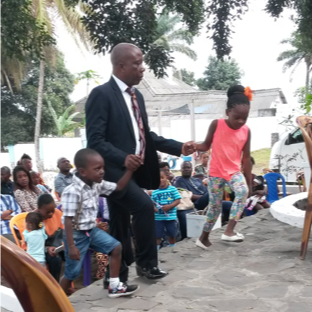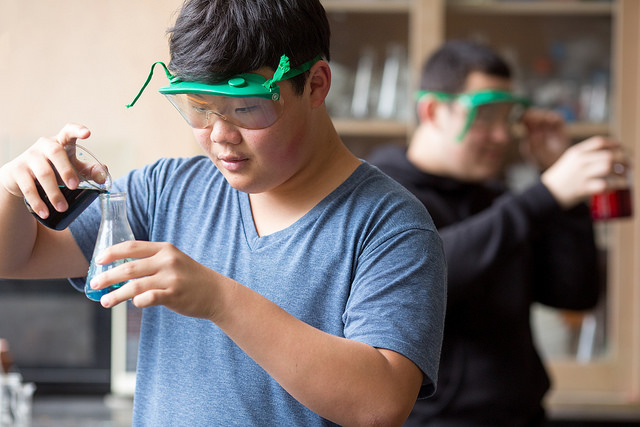Culturally Relevant Transformational Education
This year we have been examining TeachBeyond’s core values as they relate to our mission of Transformational Education. This month we’ve come to the value of cultural relevance and I [Becky] have asked a team working in a culture that is “pretty much as far as you can get from the TeachBeyond offices and from the culture in which TeachBeyond grew up” for their perspective on this. Here’s what they had to say:
What is Transformational Education? How do you do it
 These are questions we wrestle to make relevant to what we do every day. But, let’s make
These are questions we wrestle to make relevant to what we do every day. But, let’s make
it harder. Let’s consider if our answers work everywhere. Is Transformational Education the same in South America and South Asia? Do the same things work in TeachBeyond run schools that tell everyone about Jesus openly and in closed countries, where creative access opens quieter doors?
Our team is in a country, pretty much as far as you can get from the TeachBeyond offices and from the culture in which TeachBeyond grew up. When we considered these questions, we had to challenge ourselves to think about what transformational education means for us here, in our (non-TeachBeyond run) school. How do we bring transformational education into classrooms filled with real children and limited by our own busy schedules?
Here are some of our team’s thoughts on the matter.
First, “What is Transformational Education?”
Transformational education is bringing Jesus to students in an academic setting where we use education to build relational bridges strong enough to bear the weight of Truth, which is Christ-Centered and sees the students as unique individuals created in the image of God. This means that everything looks different. Discipline and teaching look different. Classroom culture looks different. It is not easy. This type of education is done through the love of God-called teachers, and it challenges motives of both teachers and students.
Transformational education has many parts but at its essence is a relationship that moves students closer to fulfilling how God designed them. It is equipping the student through information, building skills, encouragement, challenges, reflection, and other experiences where a teacher/friend comes alongside to grow the student and feed each one’s spirit while educating the mind. This serves not only to improve that student’s life, but also to impact the greater culture.
 It is education that helps each student grow to be the best he or she can be, developing the gifts and abilities that God has given them. This is a calling of transformation that takes place in natural ways until Jesus is invited into the person’s life and transformation with a capital “T” takes place. This ultimate transformation finds its fulfillment in a transformed life in Christ that changes lives from the inside out.
It is education that helps each student grow to be the best he or she can be, developing the gifts and abilities that God has given them. This is a calling of transformation that takes place in natural ways until Jesus is invited into the person’s life and transformation with a capital “T” takes place. This ultimate transformation finds its fulfillment in a transformed life in Christ that changes lives from the inside out.
And, the second question: “What do we do to create Transformational Education?”
We approached the second question with the idea that we needed to move beyond the theoretical realm into the realm of the practical. So we tried to think of what we could do in our classrooms the next day to help bring about transformational education.
To bring about Transformation with a capital T, we do a lot less than we think. The Holy Spirit is the one doing the transformation so we should follow His lead, working prayerfully and humbly under His guidance. We have to start by ourselves being transformed which allows us to love students well as we guide them to truth in all areas and point them to Jesus as Creator, sustainer, redeemer, and life giver. This begins with prayer. Then it overflows in tangible ways that we can implement that can then open a door for the Holy Spirit to do His work.
We need to show that we care more about who students are than what they can do. We do this by speaking openly and honestly with students, loving them like Christ does, even when they are not particularly likeable. We treat students with dignity, even when they are slower or disobedient. We embody love, joy and humility when we enter our classrooms, and find ways to serve our students—not just as learners but as people—living out and expressing the hidden lessons of who God is through our actions of love, joy, peace, patience, kindness, goodness, faithfulness, gentleness, self-control. We live above reproach in a culturally relevant manner.
As we plan our lessons we have a higher purpose in mind, one that transcends our daily  objectives and reminds students of the bigger picture. We work hard to create a great—and safe—environment for students to learn. We teach from a biblical worldview and encourage our students in new ways of thinking. We prepare ourselves by studying God’s word and His world, seeking to see and understand His presence in all aspects of creation (and by extension in all we teach). We let conversations with students become a priority and not an interruption.
objectives and reminds students of the bigger picture. We work hard to create a great—and safe—environment for students to learn. We teach from a biblical worldview and encourage our students in new ways of thinking. We prepare ourselves by studying God’s word and His world, seeking to see and understand His presence in all aspects of creation (and by extension in all we teach). We let conversations with students become a priority and not an interruption.
Above all, we invite the Holy Spirit to show us where He is at work already in the lives of our students, our colleagues, and our subject matter. We listen to and respond to the prompting of the Holy Spirit in our classes and interactions and direct students, teachers, and parents to God in a way that wouldn’t happen if we weren’t here. We do our best to include opportunities to introduce Him when appropriate (music or Scripture on agenda, keychain, etc.). And we have faith that He can do the impossible.
What do you think? Would these principles and practices of transformational education work in your cultural context?
A Team in Southeast Asia
Edited by: Becky Hunsberger
Teacher Education Services
TeachBeyond Global
Photo Credits: All the photos in this week’s OnPractice are taken from different TeachBeyond owned or partner schools around the world







